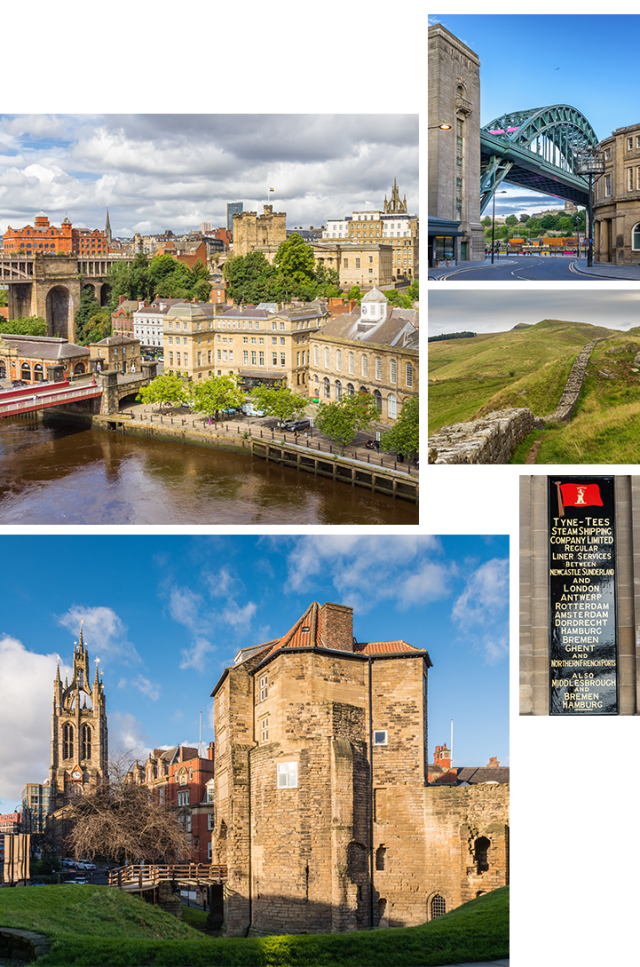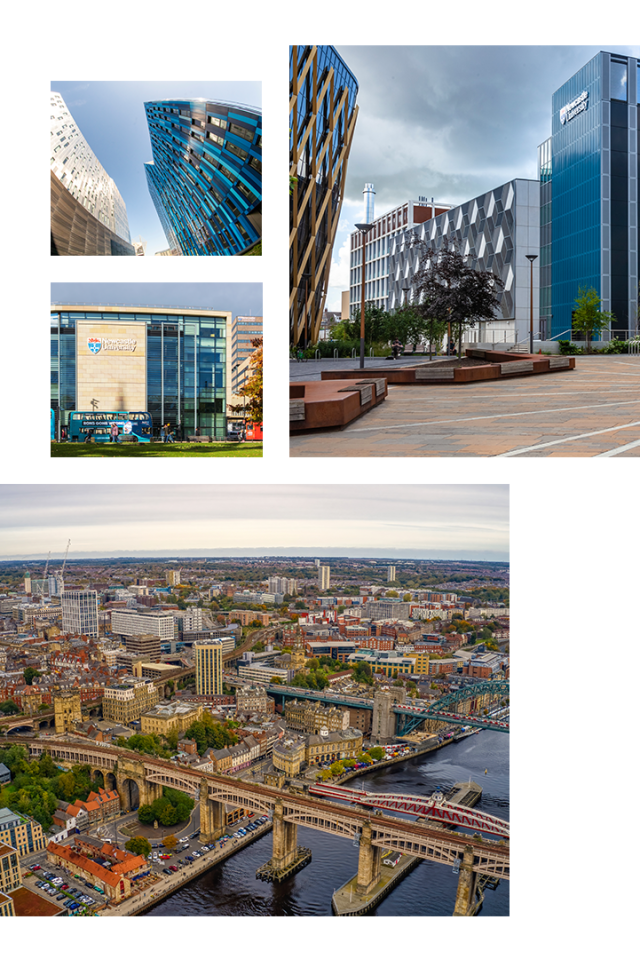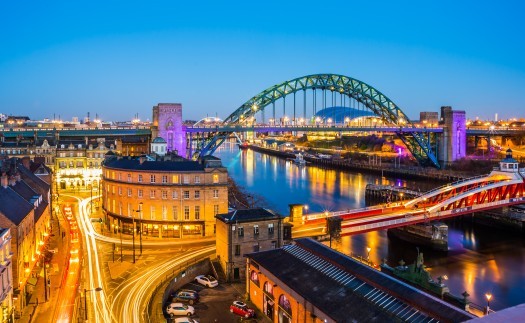Search Listings
Search Listings

Newcastle upon Tyne, once a key industrial powerhouse, is now a leading hub for innovation and culture in the North East. With major developments and a thriving university scene, the city continues to evolve while staying true to its rich heritage.

Newcastle traces its origins to 122 AD as a Roman fort along Hadrian’s Wall, originally named ‘Pons Aelius’, meaning ‘Aelius’ Bridge’. The city gained its current name during the Norman period when William the Conqueror’s son, Robert Curthose, ordered the construction of a ‘new castle’ in 1080, leading to the name ‘Novum Castellum’—Newcastle.
Throughout the Medieval Ages, Newcastle held strategic significance during conflicts with Scotland. Its castle was reconstructed in stone under Henry II, and city walls were built during Henry III’s reign, establishing the town as a key community, particularly as the wool trade thrived.
By the 16th century, Newcastle emerged as a major commercial hub, becoming the primary port for exporting North Eastern coal to London. Favourable royal policies stunted the growth of surrounding towns like Sunderland, initiating a longstanding rivalry.
During the Industrial Revolution, Newcastle was known as one of the most industrious and financially significant regions in the UK, becoming a powerhouse heavy engineering, particularly in shipbuilding and the development of railway systems, as well as continuing with coal mining.
The city's industrial prominence attracted an influx of people, growing from approximately 28,000 in 1820 to 215,000 by 1900, earning city status in 1882 before eventually experiencing a decline in heavy industry during the early 20th century.

Championing the north of England’s warm reputation, the ‘Toon’ is often regarded as one of the friendliest cities in the UK.
Once a bustling centre for coal trade and shipbuilding, the historic Newcastle and Gateshead Quayside is now a picturesque hub, featuring seven iconic bridges, including the Tyne Bridge. Visitors can explore cultural venues like the Baltic Centre for Contemporary Art and enjoy some of the North East's top restaurants and bars.
Beneath the city, the Victoria Tunnel reveals industrial heritage, originally built for coal transport and later used as an air-raid shelter during WWII, it now offers guided tours.
Perhaps the most historically significant location in Newcastle, the well-preserved Newcastle Castle, offers a captivating journey through medieval history with guided tours, interactive displays, and stunning views from the castle keep.
Directly adjacent, Grey Street, part of Grainger Town, is considered one of the UK's most beautiful streets, known for its Georgian architecture and lively atmosphere, with shops, cafes, and the historic Theatre Royal. Nearby, the Ouseburn Valley showcases Newcastle's creative side with its thriving arts scene, including The Biscuit Factory, live music venues, and independent businesses along the river.
Newcastle upon Tyne saw its population just surpass 300,000 in the 2021 census, growing by 7.1% since the 2011 census. It continues to be the most populated region in the North East and ranks as the eight largest urban agglomeration in the UK as of 2023.
Highly regarded as one of the best cities for university life, Newcastle is home to two prestigious universities, Newcastle University (a Russell Group member) and Northumbria University, attracting over 45,000 students, approximately 40% of the working age population.
The city’s population is projected to grow to 315,000 by 2040. Despite Newcastle's reputation as an affordable place to live, rising demand has raised concerns about potential housing shortages, particularly in the social and rental sectors.
The £62 million Gigabit City project has established Newcastle as a key digital hub with top-tier connectivity, offering businesses fast, low-latency links to mainland Europe and the US through the Stellium Data Centre. This initiative also includes CityFibre's £50 million full-fibre plan, which enhances local broadband for households too.
Newcastle Airport connects travellers to over 70 international destinations while the nearby European Cruise Terminal further connects the city to mainland Europe, helping to attract more tourists. Additionally, the two major commercial ports of Tyne and Blyth provide Newcastle with excellent logistics options.
The rail network provides links to other UK major cities, such as London, Manchester and Edinburgh, all reachable within three hours as well as being connected by the A1(M).
Newcastle also benefits from the Tyne and Wear Metro as it connects key areas of the city to surrounding regions within the North East, linking urban, suburban, and coastal areas together.

Having long been recognised as the hub of North East England, Newcastle has evolved beyond its industrial roots. Today, the inner city’s urban economy is worth £9.9 billion, building on the city’s legacy of technological and engineering excellence.
With over £30 billion worth of investment opportunities in the area and16,000 acres of developable land, Newcastle provides extensive venture opportunities for investors while simultaneously supporting businesses with a wide range of funding solutions, ranking as the eighth best environment for start-ups in the UK.
This is further supported by a £4.2 billion devolution agreement in the North East, which includes a £1.4 billion investment fund providing £48 million annually.
A strong culture of collaboration through public and private institutions underpins the economy, with the two universities contributing significantly to the city’s sectoral strengths in research and innovation, especially in medical advancements.
In fact, the North East is becoming a powerhouse for innovation, boasting the largest concentration of STEM students in the UK outside of London when combining Newcastle, Northumbria, and Durham universities. This creates a strong pool of talented employees, with Newcastle University ranking 5th for the highest graduate retention rate in England.
The multiple innovation hubs and collaboration centres in the city, including Newcastle Helix, The UK Nation Innovation Centre for Ageing, and The National Innovation Centre for Data, have strong academic ties to the universities, providing access to expertise and resources to drive development.
The digital and technology industries are also major economic drivers, following an increasing presence of major companies, such as Newcastle-born FTSE 100 member Sage Group PLC, Ubisoft, and Accenture, leading to strengths in gaming, e-commerce, and software development.

Newcastle is poised for significant transformation with several high-profile commercial development projects on the horizon, reinforcing its status as a regional economic powerhouse. Central to this evolution is the ongoing, 24-acre project Newcastle Helix, a pioneering mixed-use development that is delivering state-of-the-art office spaces, research facilities, and residential units.
Another key initiative is the East Pilgrim Street Regeneration, particularly through Pilgrim Place, which will deliver over 400,000 sq ft of Grade A office space and vibrant retail and leisure facilities across a 7.9-hectare site, creating thousands of jobs.
Complementing this is the Quayside Redevelopment, which seeks to revitalise the waterfront area even further with additional commercial offerings while integrating it with the city's cultural and leisure activities, ultimately enabling the creation of a vibrant new neighbourhood with capacity for around 1,100 homes.
Finally, the Central Station Redevelopment, funded by a £2.5 million boost, will enhance connectivity with a new entrance on Neville Street, a pedestrianised Orchard Street tunnel, and an upgraded Forth Street tunnel for a new pedestrian and cycle "highline." These upgrades aim to create a modern gateway and new business opportunities, reinforcing Newcastle's commitment to economic growth.
Local office finder
Eddisons boasts a national presence, with offices located throughout the UK.
Discover your nearest one today.
Find Your Office
Contact details
2nd Floor, 10 Wellington Place, Leeds, LS1 4AP
This site uses cookies to monitor site performance and provide a more responsive and personalised experience. You must agree to our use of certain cookies. For more information on how we use and manage cookies, please read our Privacy Policy.